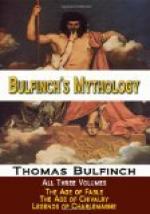A specimen of the style of the prose romances may be found in the following extract from one of the most celebrated and latest of them, the “Morte d’Arthur” of Sir Thomas Mallory, of the date of 1485. From this work much of the contents of this volume has been drawn, with as close an adherence to the original style as was thought consistent with our plan of adapting our narrative to the taste of modern readers.
“It is notoyrly knowen thorugh the vnyuersal world that there been ix worthy and the best that ever were. That is to wete thre paynyms, three Jewes, and three crysten men. As for the paynyms, they were tofore the Incarnacyon of Cryst whiche were named, the fyrst Hector of Troye; the second Alysaunder the grete, and the thyrd Julyus Cezar, Emperour of Rome, of whome thystoryes ben wel kno and had. And as for the thre Jewes whyche also were tofore thyncarnacyon of our Lord, of whome the fyrst was Duc Josue, whyche brought the chyldren of Israhel into the londe of beheste; the second Dauyd, kyng of Jherusalem, and the thyrd Judas Machabeus; of these thre the byble reherceth al theyr noble hystoryes and actes. And sythe the sayd Incarnacyon haue ben the noble crysten men stalled and admytted thorugh the vnyuersal world to the nombre of the ix beste and worthy, of whome was fyrst the noble Arthur, whose noble actes I purpose to wryte in this person book here folowyng. The second was Charlemayn, or Charles the grete, of whome thystorye is had in many places both in frensshe and englysshe, and the thyrd and last was Godefray of boloyn.”
CHAPTER II
THE MYTHICAL HISTORY OF ENGLAND
The illustrious poet, Milton, in his “History of England,” is the author whom we chiefly follow in this chapter.
According to the earliest accounts, Albion, a giant, and son of Neptune, a contemporary of Hercules, ruled over the island, to which he gave his name. Presuming to oppose the progress of Hercules in his western march, he was slain by him.
Another story is that Histion, the son of Japhet, the son of Noah, had four sons, Francus, Romanus, Alemannus, and Britto, from whom descended the French, Roman, German, and British people.
Rejecting these and other like stories, Milton gives more regard to the story of Brutus, the Trojan, which, he says, is supported by “descents of ancestry long continued, laws and exploits not plainly seeming to be borrowed or devised, which on the common belief have wrought no small impression; defended by many, denied utterly by few.” The principal authority is Geoffrey of Monmouth, whose history, written in the twelfth century, purports to be a translation of a history of Britain brought over from the opposite shore of France, which, under the name of Brittany, was chiefly peopled by natives of Britain who, from time to time, emigrated thither, driven from their own country by the inroads of the Picts and Scots. According to this authority, Brutus was the son of Silvius, and he of Ascanius, the son of Aeneas, whose flight from Troy and settlement in Italy are narrated in “Stories of Gods and Heroes.”




